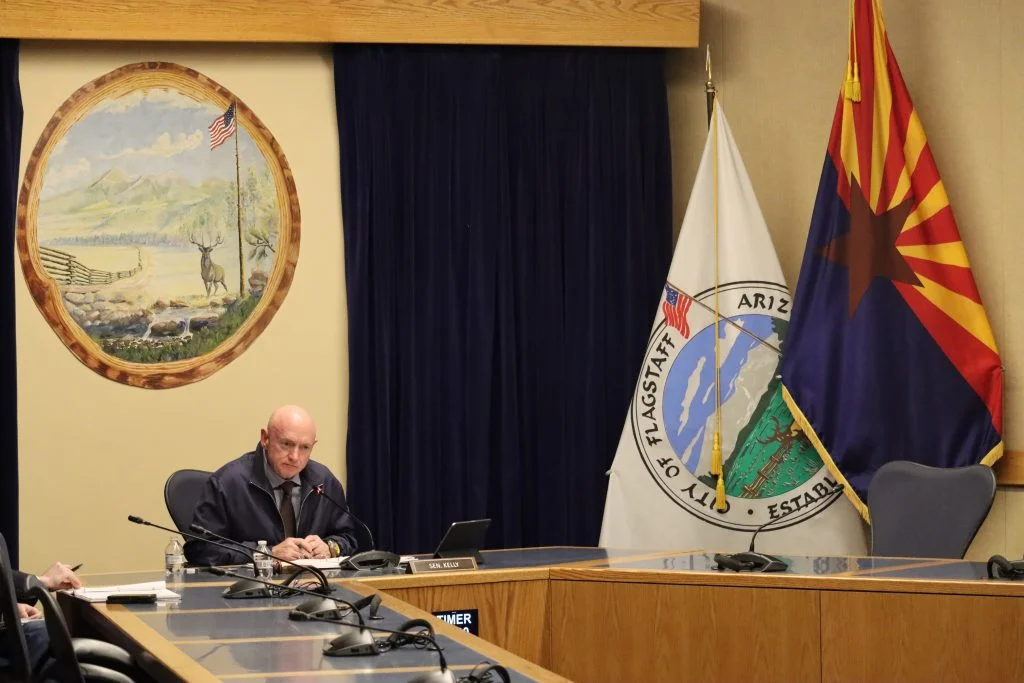WATCH: Kelly Leads Water and Flood Control Hearing in Flagstaff
Kelly and Arizona witnesses highlight water infrastructure needs of small, rural communities facing the impacts of drought and flooding
Today, Arizona Senator Mark Kelly, Chair of the Senate Committee on Environment and Public Works (EPW) Subcommittee on Transportation and Infrastructure, led a hearing in Flagstaff— the first Senate hearing in the city in more than 30 years. The hearing focused on the water infrastructure needs of small, rural communities in the western U.S. As Arizona communities cope with the impacts of both drought and destructive flooding, Kelly highlighted successful projects including Rio de Flag, the Winslow Levee, and the Pascua Yaqui Waterline and discussed how the U.S. Army Corps of Engineers can play a larger role in addressing drought in the west.
During the hearing, Kelly announced his plans to introduce new legislation—The Drought Resilient Infrastructure Act—to create new programs and give new authorities to the Army Corps specifically to respond to drought conditions.
The hearing featured testimony from the U.S. Army Corps of Engineers and local government leaders, including Flagstaff Mayor Becky Daggett, Navajo County Supervisor Alberto Peshlakai, and Pascua Yaqui Chairman Peter Yucupicio.
Click here to download video of the hearing. Click here for photos of the Rio de Flag walking tour.

See below for key excerpts from Kelly and witness testimony during the hearing:
Kelly on why he brought the committee to Flagstaff (0:01:18):
In advance of considering the next water infrastructure bill, I wanted to make sure that this subcommittee left Washington, D.C., and came to Arizona to hear firsthand from local Army Corps officials and community leaders about how the Corps is working to support Arizona’s water infrastructure. As everyone here in Arizona knows—water is a critical issue for our continued prosperity.
Kelly on why he’s introducing legislation to give the Army Corps a larger role in addressing water conservation in Arizona (0:05:43):
Making sure that the next water infrastructure bill gives the Army Corps of Engineers the tools it needs to respond to the challenges we’re facing here in Arizona is a priority of mine. That’s why over the past few months I’ve been working on legislation—called the Drought Resilient Infrastructure Act—that gives new authorities to the Army Corps so that they can take on more projects that help Arizona and the west respond and adapt to drought conditions.
Colonel Andrew Baker on the Winslow Levee (0:14:05):
In 2006, due to the condition of a locally constructed levee on the western bank of the Little Colorado River, FEMA decertified this levee. This had a dramatic and immediate effect on an already predominantly underserved and overburdened community, causing property values within the floodplain to plummet and stymying economic growth and development for the past 18 years. In fiscal year 2022, Congress appropriated $2.5 billion in Bipartisan Infrastructure Law funding for inland flood risk management projects. Out of that amount, the Department of the Army allocated $65 million to this project. I recently had the opportunity to visit the project area with some of our partners here today along with other City of Winslow and County officials. Being there and seeing firsthand the impact that this project will have on the community is astounding, and I am honored to serve with the team that will make it a reality.
Flagstaff Mayor Becky Daggett on Rio de Flag Flood Control Project (0:55:15):
When this project is completed, it will have a transformational effect on our town. First, it will remove over half of our residents and over 1,500 structures from the floodplain, including Northern Arizona University and, yes, City Hall, where we are sitting right now. Second, it will allow for the first time in many people’s lifetimes, including our former esteemed Mayor and your current northern Arizona Director, Coral Evans, to make improvements to their houses and businesses in the Southside neighborhood that they haven’t been able to make in decades because of the simple fact that they lie in the floodplain. Third, it will eliminate costly flood insurance requirements for many residents. Finally, it will allow for more than $1 billion in economic development that will be a boon for residents and visitors alike. In short, this project will transform this great city.
Navajo County Supervisor Alberto Peshlakai on benefits of Winslow Levee project (1:23:30):
Particularly the Bird Springs chapter in Leupp outside of Winslow has been historically affected by the flood events. Especially when the river overtops the roads, making them impassable into the city of Winslow. With the rehabilitated levee system and flood reduction benefits that go with it, tribal residents will have a more dependable access to health services, emergency services, groceries, and other necessities.
Pascua Yaqui Tribe Council Chairman Peter Yucupicio on the Tribal Wellness Center Non-Potable Water Line Project (1:16:10):
Particularly in this project, the CAP [Central Arizona Project] water line is right next to us, but you can’t access it because it belongs to CAP. This will enable us to tap into that, and water our fields and stuff like that. We are also looking at water conservation efforts, as far as rainwater and using that and utilizing that for other areas, and residential. But what we are right doing now is we’re leasing water from other tribes, and then we’re also having an IGA [intergovernmental agreement] with the City of Tucson to provide potable drinking water. That would help cut the cost of that, which would then, for more than maybe 1500 tribal members that are looking for housing, would allow us to build a few more houses to house them in affordable housing.
